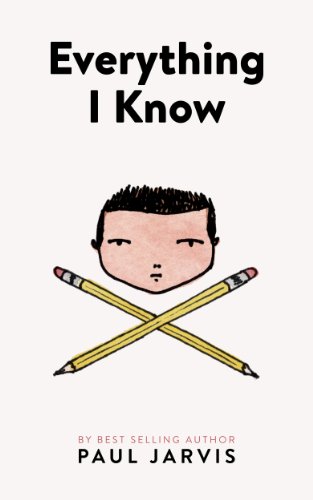Everything I Know Summary
6 min read ⌚
 The Basics of Creating a Learning and Problem-Solving Culture
The Basics of Creating a Learning and Problem-Solving Culture
If you want to learn how you can be your own boss – and still achieve stellar heights – it’s good to know a guy like Paul Jarvis. Because he wants to share his entire knowledge with you and teach you everything he knows.
And our “Everything I Know” summary is everything we know about his book.
Who Should Read “Everything I Know”? And Why?
“Everything I Know” reads like a host of haphazard advice taken out from personal experience. Consequently, it’s flexible and adaptable, or, in other words, different parts of it would appeal to different categories of people.
The creative type would certainly benefit most. But even entrepreneurs will be able to find something for them here. Just as people with great ideas and/or products, who have failed to monetize them.
About Paul Jarvis
Paul Jarvis has spent most of his professional life in the online tech world. He is the strategist and designer behind some of the world’s most successful online businesses. His clients include Microsoft, Yahoo, Mercedes-Benz, Danielle LaPorte, Marie Forleo, The High Line and many more.
has spent most of his professional life in the online tech world. He is the strategist and designer behind some of the world’s most successful online businesses. His clients include Microsoft, Yahoo, Mercedes-Benz, Danielle LaPorte, Marie Forleo, The High Line and many more.
In addition to “Everything I Know,” he has authored three more books: “The Good Creative,” “Company of One” and “Be Awesome at Online Business.”
“Everything I Know Summary”
So, you want advice on how to write your masterpiece? Or how to invent the product which will disrupt the market and make you the next Steve Jobs? Or, maybe, you just want to learn how to win a million dollars?
Then, “Everything I Know” is probably not for you.
Because Paul Jarvis doesn’t believe in easy solutions or “one-size-fits-all advice”! On the contrary, he’s all about uniqueness and fluidity. And, though, paradoxically, that means that his book sometimes tends to incline towards clichés and common knowledge, it’s still a great read!
After all, some phrases have become truisms and sayings because they often proved to be correct; not because people are uninventive.
Paul Jarvis’ first advice is twofold: use two guidelines to find your path.
First of all, align your life mission with your values. Although, this is something obvious in itself, the real reason for it may be a little less apparent.
Namely, whether in school or at work, you’re used to external grading. However, if you don’t work what you really want to – and you’re, like Jarvis, a boss of your own – then, you won’t be motivated enough to do your own work – unless it’s one which expresses your values unwaveringly and wholly.
Which brings us to the second guideline.
Namely, when you’re doing what you know and like – don’t even think for a moment to do it the way others are doing it. Do it your own way! You need to be unique – and find a way to pair your uniqueness to a market need.
Everything else is imitation and living in someone else’s shoes.
If Richard Branson had did it the copycat way, you wouldn’t have known The Sex Pistols today. (Hey, that’s a rhyme! Maybe we should dip our fingers in the springs of poetry next time… That’s not a bad idea – at all… maybe, that’s our unique call?)
Branson was a rebel – he projected this image into his doings; and the world loved it! Because, let’s face it, the only thing people like more than is the real deal.
But, don’t be fooled: even the real deal hasn’t fallen from Mars! (That is, unless he’s Ziggy Stardust!) We are the product of what we listen and watch, what we read and what we know and what we think about all the time.
In other words, as T. S. Eliot wrote in his essay “Tradition and the Individual Talent,” our idols and competitors are not our enemies; but, actually, they are everything that we know about our field of work.
Consequently, it’s not only allowed to use their work so as to create ours – it’s a requirement! And if you are still in doubt whether we’re advocating stealing, let us ease your troubles: yes, we are. However, it comes with a caveat: do steal; but steal like an artist.
The aforementioned T. S. Eliot has the best quote on this:
“Immature poets imitate; mature poets steal; bad poets deface what they take, and good poets make it into something better, or at least something different.”
While we’re here, you want another Eliot tip you won’t find in Jarvis’ book? Here it is:
“A good poet will usually borrow from authors remote in time, or alien in language, or diverse in interest.”
You know – so that it’s more difficult to find the sources…
And yes – T. S. Eliot won the Nobel Prize for Literature.
So, you’re good to go.
Key Lessons from “Everything I Know”
1. Don’t Pursue Goals: Align Your Work with Your Values and Skills
2. Share Your Work and Don’t Be Afraid of Criticism, But Welcome Feedback
3. Be a Great Artist: Transform Stolen Works into Something Better
Don’t Pursue Goals: Align Your Work with Your Values and Skills
If you’re in it for the money, you’re not in it at all!
And the same holds true for a host of external motivators, whether we’re talking about diplomas or grades, twitter followers or public recognition.
Simply put, external motivation rarely works the long term – and, even when it does, it can make you happy just for a brief period of time. Right at the end.
The point is to be happy throughout it all! You know what they say: the goal of the journey is not the goal – but the journey itself.
So, plan it the way it would best suit you. Namely, align it with your interests, skills, and values. If you do that, it ultimately won’t matter if you succeed.
Your whole life will be a success.
Share Your Work and Don’t Be Afraid of Criticism, But Welcome Feedback
Now, let us get one thing straight: whatever you’re doing, you’re not really doing it for yourself exclusively. Even if you’re writing a book you’re not planning to publish during your lifetime, the little voice you have in your head is actually your future readers talking to you what you can do better the next time.
In other words, humans are part of societies; just as inevitably as your work is – be it an invention, scientific contribution, or an artistic creation.
So, be prepare to share what you do with others. And be even more prepared to face some vicious criticism. But, don’t be afraid of it! Because some of it is just out of spite: remember celebrities reading their mean tweets? And the other part is constructive and will help you become better.
Differentiate well – and don’t dwell any more than a second on the former.
Be a Great Artist: Transform Stolen Works into Something Better
Finally, if you want to be an original artist, learn the best way to achieve originality: steal from others.
Of course, stealing is only a part of it. (Otherwise, we would be advocating plagiarism, won’t we?)
However, the other part is the more difficult one. It means spending hours and hours researching through various sources and taking away the best of each of them; next, it means combining these best bits into a new work; and, finally, it means shaping the new work in a coherent and/or functional product.
Stealing has never seemed more difficult.
Like this summary? We’d like to invite you to download our free 12 min app, for more amazing summaries and audiobooks.
“Everything I Know” Quotes
What if instead of reading, you wrote? Instead of watching TV, you made videos? Instead of listening to music, you learned how to play guitar? Share on X A large part of choosing your path is figuring out which values will determine your worth. Once that’s clear, it’s much easier to decide if the work you’re doing will increase or decrease your feelings of worth. Share on X Most reasons to delay are invalid if you get right to the core: no time, no money, no audience. These are all future concerns, which make it hard to start anything. Worry about those things later or not at all. Share on X A funny thing happens when you focus on work that you love; more soon starts to appear. Like attracts like. Plus, that intersection between enjoying what you do and getting paid to do it is the sweetest place of all. Share on X You shouldn't pay attention to things that don't grab your attention. If you do, you're being a pretentious douchebag. Share on XOur Critical Review
When a guy as successful as Paul Jarvis writes a book containing everything he knows, there’s certainly more than one reason to read it.
Short and sweet – just as all of its chapters – “Everything I Know” doesn’t try to look organized or anything.
But that may be its biggest advantage.
Emir is the Head of Marketing at 12min. In his spare time, he loves to meditate and play soccer.


 The Basics of Creating a Learning and Problem-Solving Culture
The Basics of Creating a Learning and Problem-Solving Culture 




